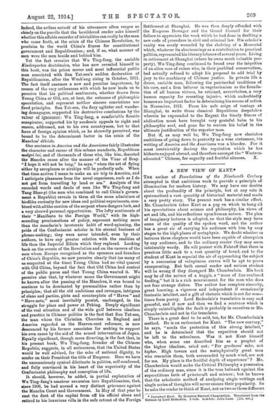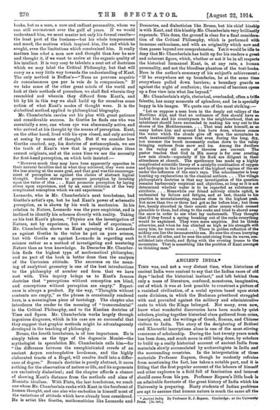A NEW VIEW OF KANT.*
THE author of Foundations of the Nineteenth Century attempted in that ambitious work to provide a principle of illumination for modern history. We may have our doubts about the profundity of the principle, but at any rate it systematized a vast quantity of historical material and made a very pretty story. The present work has a similar effect. Mr. Chamberlain takes Kant as a peg on which to hang all his speculations about science and philosophy, his views of art and life, and his reflections upon human nature. The plan of imaginary lectures is adopted, so that the style may have some of the quality of the spoken word, and the author has a great air of carrying his audience with him by easy stages to the high places of metaphysic. We doubt whether as lectures these chapters would have been capable of absorption by any audience, and to the ordinary reader they may seem intolerably wordy. He will protest with Falstaff that there is precious little sack to a vast quantity of bread, and to the student of Kant in especial the air of approaching the subject by a succession of voluptuous curves will be apt to prove exasperating. But both casual reader and serious student will be wrong if they disregard Mr. Chamberlain. His book may be of the nature of a haggis, a " mass of fine confused feeding," but it is a rich nourishment for the man who does not fear strange dishes. The author has complete sincerity, great learning, a vigorous and independent if occasionally fantastic intellect, and a gift of rhetoric which is not far some- times from poetry. Lord Redesdale's translation is easy and graceful, and if now and then we find a sentence which is simply unintelligible the fault is probably in ourselves or Mr. Chamberlain and not in the translator.
There is a great deal to be said, too, for Mr. Chamberlain's method. He is an enthusiast for Kant. "The new century," he says, "needs the protection of this strong intellect," and he is determined that the exposition should not be left to the schoolmen. Was it not Kant himself who, when some one described him as a prophet of the higher idealism, cried out " For goodness' sake, not higher. High towers and the metaphysically great men who resemble them, both surrounded by much wind, are not for me. My place is the fruitful depth of experience " P Mr. Chamberlain would make the Critical Philosophy a possession of the ordinary man, since it is the true bulwark against the superstitions both of priesteraft and science ; but be knows that the scholastic method of analysing single writings and single series of thoughts will never ensure their popularity. So he asks the reader to think of Kant, not as two or three different
• Immanuel Kant. By Houston Stewart Chamberlain. Translated from the German by Lord Redesdale. 2 vols. London: John Lane. [me. net.)
books, but as a man, a rare and radiant personality, whom we can still reconstruct over the gulf of years. If we would understand him, we must master not only his formal results— the least part of the business—but his whole temperament and mood, the motives which inspired. him, the end which he sought, even the limitations which constrained him. It really matters less what a man saw and thought than how he saw and thought it, if we want to arrive at the organic quality of his intellect. It is very easy to tabulate a neat set of doctrines which we may label the Critical Philosophy, but that will
carry us a very little way towards the understanding of Kant. The only method is Buffon's—"Nous ne pouvons acquerir de connaissances que par la voie de la comparaison." If we take some of the other great minds of the world and look at their methods of procedure, we shall find wherein they resembled and wherein they differed from Kant's, and bit by bit in this way we shall build up for ourselves some
notion of what Kant's modes of thought were. It is the dialectical method applied to philosophical biography.
Mr. Chamberlain carries out his plan with great patience and considerable success. In Goethe he finds one who was essentially a seer, one whose eye was abnormally active, and who arrived at his thought by the means of perception. Kant, on the otter hand, lived with his eyes closed, and only arrived at seeing by means of thought. But if we consider how Goethe reached, say, his doctrine of metamorphosis, we see the truth of Kant's view that in perception alone ideas
cannot originate, and at the same time we see the necessity for first-hand perception, on which both insisted:— "However much they may have been apparently opposites in their natural faculties and in what they achieved, they were none the less aiming at the same goal, and that goal was the encourage- ment of perception as against the claims of abstract logical thought. Goethe strives to promote perception by insisting upon the value of idea . . . Kant promotes perception by laying stress upon experience, and by an exact criticism of the very complicated conception which we call experience."
Leonardo, who is Mr. Chamberlain's next touchstone, had Goethe's artist's eye, but he bad Kant's power of schematic perception, as is shown by his work in mechanics. In his relation to Nature, Leonardo was the pure empiricist, and is inclined to identify his schemes directly with reality. Taking as his text Kant's phrase, " Physics are the investigation of Nature, not by experience, but on behalf of experience," Mr. Chamberlain shows us Kant agreeing with Leonardo as against Goethe in the value he put on pure science, but with Goethe as against Leonardo in regarding such science rather as a method of investigating and mastering Nature than as true knowledge. In Descartes Mr. Chamber. lain finds the highest type of mathematical philosopher, and no part of the book is better done than the analysis of the Cartesian attitude. The excursus on the mean- ing of analytical geometry is one of the best introductions to the philosophy of number and form that we have met with. This inquiry brings us to Kant's famous doctrine that "perceptions without conception are blind, and conceptions without perception are empty." Experi- ence is always a product. By the way, "Thoughts without contents are empty," as the phrase is occasionally rendered here, is a meaningless piece of tautology. The chapter also introduces the reader to the meaning of " transcendental" in the Critical Philosophy, and to the Kantian doctrine of Time and Space. Mr. Chamberlain works largely through ingenious diagrams, which in his case are so successful that they suggest that graphic methods might be advantageously developed in the teaching of philosophy.
Bruno, the fourth touchstone, is of less importance. He is simply taken as the type of the dogmatic Monist—the mythologist in speculation Mr. Chamberlain calls him—for " the difference between the unsophisticated creeds of an ancient Aryan contemplative herdsman, and the highly elaborated tenets of a Hegel, will resolve itself into a differ- ence of degree." Bruno's doctrine is purely abstract, it cares nothing for the observation of nature or life, and its arguments are exclusively dialectical; and the chapter affords a chance of showing Kant's distance from the methods and aims of Monistic idealism. With Plato, the last touchstone, we reach one whom Mr. Chamberlain ranks with Kant in the forefront of human thought, and one also who embodies in himself most of the variations of attitude which have already been considered. He is artist like Goethe, mathematician like Leonardo and Descartes, and dialectician like Bruno, but his chief kinship is with Kant, and this kinship Mr. Chamberlain very brilliantly expounds. This done, the ground is clear for a final considera- tion of the Critical Philosophy, which is performed with immense enthusiasm, and with an originality which now and then passes beyond our comprehension. Yet it would be idle to deny that Mr. Chamberlain has built up for his readers a great and coherent figure, which, whether or not it be in all respects the historical Immanuel Kant, is, at any rate, a human personality, and not the bloodless phantom of the text-books. Here is the author's summary of his subject's achievement: "If he everywhere set up boundaries, he at the same time everywhere pulled down barriers ; a boundary guards us against the night of confusion; the removal of barriers opens up a free view into what lies beyond."
Mr. Chamberlain's style, rhetorical, overloaded, often a trifle falsetto, has many moments of splendour, and he is specially happy in his images. We quote one of the most striking :—
"Let us suppose a man born in the deeply cut valleys of the Maritime Alps, and that an ordinance of fate should have so locked him and his countrymen to the neighbourhood, that no inhabitant should have succeeded in making his way out to the shores of the Mediterranean. . . . That man asks himself, as so many before him and around him have done, whence comes the water which the clouds give off upon the mountains in such inexhaustible measure that even during the long, dry, hot summer the brook incessantly rushes down to the valley bringing coolness from snow and ice. Among the dwellers in the valley all sorts of theories are current. The pastor teaches that God in His mercy is for ever creating new rain clouds—especially if his flock are diligent in their attendance at church. The apothecary has made up a highly complicated scientific theory of a catalytic combination of oxygen and hydrogen in the low pressure of the highest regions of the air under the influence of the sun's rays. The schoolmaster is busy hunting up explanations in the classical authors. . . . The village philosopher's doctrine is that any investigation of the question remains barbarously empirical and objectless, so long as it is not determined whether water is to be regarded as substance or attribute. . . . Meanwhile our friend actively climbs uphill, is undaunted by failure and fatigue, and at last, thanks to hie practice in mountaineering, reaches close to the highest peak. Not more than two or three had got so far before him ; but these few, keenly absorbed in their search after causes which seemed plausible to them, had clung to the rocks and tried to shovel away the snow in order to see what lay underneath. They thought that if they found a spring breaking out of the rocks everything would be explained. They were mere empirics. But he thinks otherwise, and ashen he has climbed as high as his strength will carry him, he turns round. . . . There in golden reflection of the midday sun lies the immeasurable sea. He sees the rivers hurrying to it from all sides, and he sees the mist rising from its waves, con- solidated into clouds, and flying with the evening breeze to the mountains. That is something like the position of Kant amongst us thinking men."



































 Previous page
Previous page